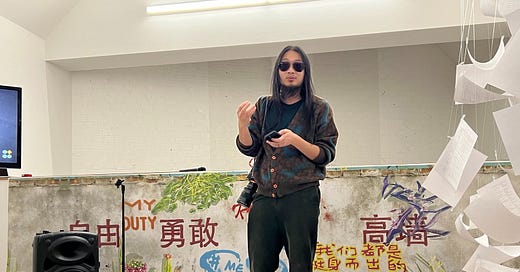Artist Jiang Bu Says Freedom is Defined By Our Actions
The artist shares what his project "Looking For Freedom in Beijing" taught him about the meaning of freedom
At the opening night in London of “A4 Revolution Anniversary: Transnational Solidarity for Human Rights in Europe,” a traveling exhibit organized by young Chinese dissidents to commemorate the one-year anniversary of the White Paper Movement, artist Jiang Bu spoke about the meaning of freedom and how it evolved over the course of the White Paper Movement.
Full text below in English and Chinese/中文.
“Looking for Freedom in Beijing” is a project I began in 2021. I invited project participants to search for the word "freedom" on the streets of Beijing. So far, more than 200 people have participated, and I have collected more than 500 instances of "freedom." But rather than the number of times “freedom” appears, what is more important to me is that in the process of searching for the word, people can imagine and think about what freedom means. From my personal life experience, Beijing is a very unfree city. Finding hundreds or thousands of "freedoms" in Beijing sounds somewhat absurd. The “freedom” that each person finds is like casting a vote for freedom, and the path to look for “freedoms” is itself the process for approaching freedom. The meaning of “freedom” is defined by our actions.
Participants in the initial project found some scattered glimpses of freedom, but the critical turning point actually occurred on October 13, 2022, when Peng Zaizhou, at great expense to himself, passed on his courage to the entire society. From Peng Zaizhou to the White Paper Movement, countless handwritten characters for "freedom" appeared in Beijing and even across the country. Before, people just looked for the word "freedom" in Beijing, but after the White Paper Movement, they themselves wrote “freedom” in their own lives. The White Paper Movement was the first time our generation moved from online to offline, and it was also the first time that we said “no” to the CCP regime. After Sitong Bridge, and after the White Paper Movement, freedom began to flourish. All kinds of freedoms sprung up like mushrooms after a rain. Some people found it in flags from the music festival, some found it in words of appreciation after an exhibition, and some found it in a cup of mulled wine or coffee.
Maybe it’s not that Beijing in 2023 suddenly has so much freedom, but that more people have the eyes to discover freedom and try to find freedom in their lives. Behind the “freedoms,” I saw countless free wills quietly growing on that land. Like the seven thousand oak trees that Beuys planted in the city of Kassel, I also look forward to the day when there will be seven thousand or more people looking for freedom on the streets of Beijing. The word "freedom" is defined by our actions. The process of finding freedom is also the path to freedom. When we stop seeking freedom, freedom will be at risk even in Britain or France. But when we seek, and when we fight back, it is in that moment that we will gain true freedom.
这是一个我2021年开始的项目,我邀请项目的参与者在北京的街头寻找「自由」两个字,目前已有二百多人参与,我收集到了五百多张自由。相对于自由的数量,对我来说更重要的是,人们在寻找的过程中可以想象和思考什么是自由。以我个人的生活经验而言,北京是个非常不自由的城市,在北京找到成百上千个「自由」听起来多少有些荒诞。每个人找到的自由像是为「自由」投出的一张选票,而寻找自由的道路正是无限逼近自由的过程,自由一词的所指也经由我们的行动而定义。
最开始的项目的参与者找到了些零零碎碎的自由,最重要的转折点其实出现在2022年的十月十三号,就是彭载舟以自己为代价向整个社会释放的勇气。从彭载舟开始到白纸运动,北京乃至全国各地都出现了无数个手写的“自由”,在这之前人们只是在北京寻找“自由”这两个字,然后他们在白纸运动之后,就是他们直接在生活里书写自由,白纸运动是我们这个世代第一次从线上走到线下,也是第一次向这个政权说不。四通桥之后呢,其实,包括白纸运动之后,自由开始变得百花齐放起来。各种各样的自由,就是像雨后春笋那样涌了出来,有人找到了音乐节的一些旗帜,有人找到了展览中的饱览词,有人找到了一杯热红酒或者咖啡
或许并不是二零二三年的北京突然多了这么多的自由,而是更多的人有了发现自由的眼睛,并尝试在生活中寻找自由。这些自由的背后,我看到了无数个自由意志在那片土地上悄然生长。像博伊斯在卡塞尔这个城市种下的七千棵橡树一样,我也期待着有朝一日在北京街头会有七千甚至更多个人在北京的街头寻找自由。“自由”这个词经我们的行动而定义,寻找自由的过程也是无限必经自由的道路,当我们停止寻找自由的脚步的时候,即使是在英国或者法国,自由也会变得岌岌可危,就当人们去寻找,去抗争的时候,在那一刻我们才能获得真正的自由。



